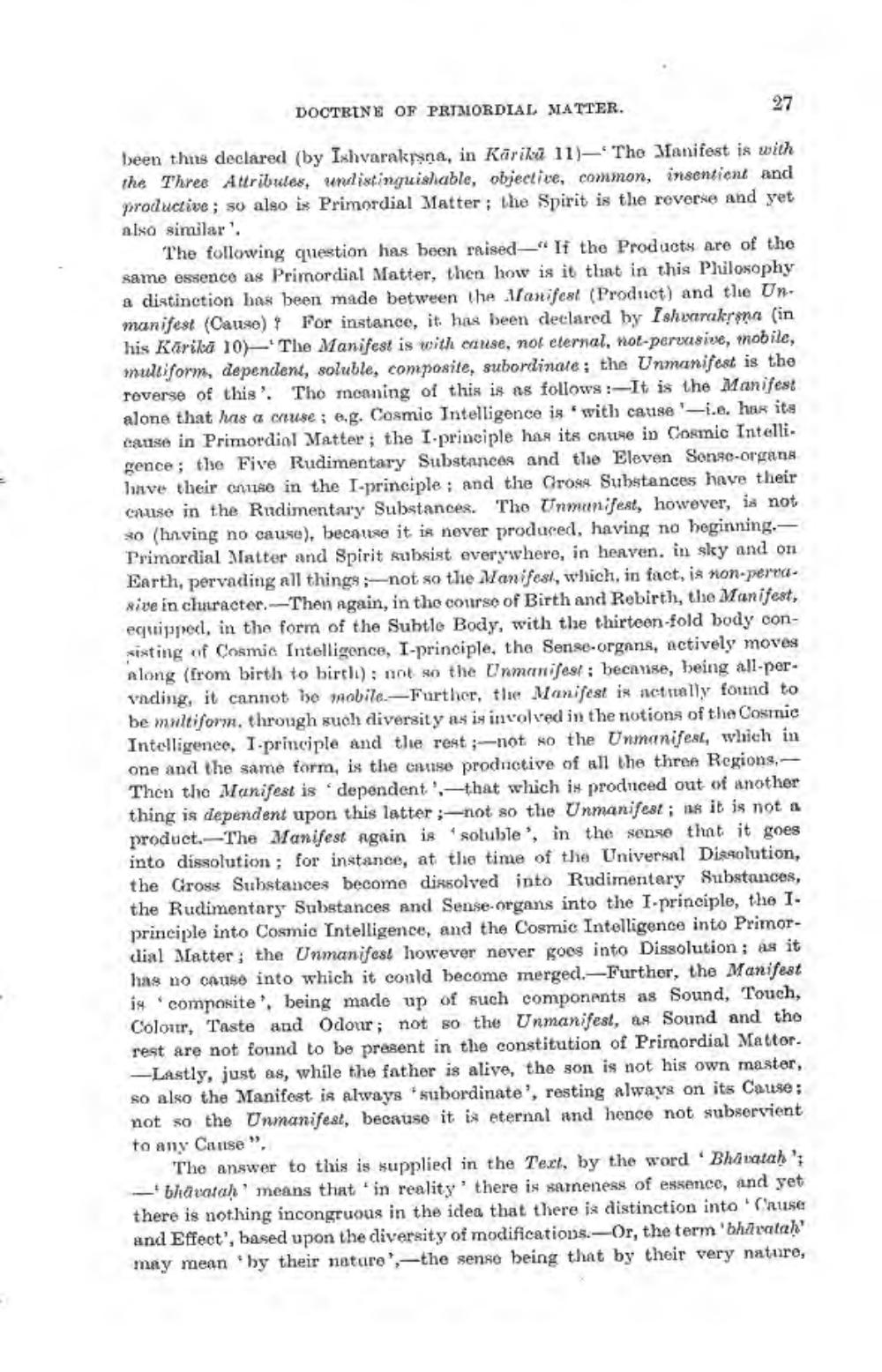________________
DOCTRINE OF PRIMORDIAL MATTER.
27
been thus declared (by Ishvarakına, in Rrika 11)- The Manifest is with the Three Attributes, undistinguishable, objective, common, insentient and productive; so also is Primordial Matter; the Spirit is the reverse and yet also similar
The following question has been raised" If the Products are of the same essence as Primordial Matter, then how is it that in this Philosophy a distinction has been made between the fanifest (Prodnet) and the Un. manifest (Cause) | For instance, it has been declared by Ishvarakrena (in his Kārika 10) The Manifest is with cause, nof eternal, not-peroxısive, mobile, nulliform, dependent, soluble, composite, subordinate; the Unmanifest is the reverse of this'. The meaning of this is as follows:- It is the Manifest alone that has a cause; e.g. Cosmic Intelligence is with cause '-i.e. has its cause in Primordial Matter; the I-principle has its caure in Cosmic Intelli. gence; the Five Rudimentary Substances and the Eleven Sense-organs have their cruise in the I-principle; and the Cross Substances have their cause in the Rudimentary Substances. The Unmanifest, however, is not 30 (having no cause), because it is never produced, having no heginning.-- Primordial Matter and Spirit subsist everywhere, in heaven, in sky and on Earth, pervading all things not so the Manifest, which, in fact, is non-pernd. sive in character. --Then again, in the course of Birth and Rebirth, the Manifest, equipped, in the form of the Subtle Body, with the thirteen-fold body consisting of Cosmic Intelligence, I-principle, the Sense-organs, actively moves Along (from birth to birth); not so the Unmanifest ; becanse, being all-pervading, it cannot be mobile-Further, the Manifest is actually found to be multiform. through such diversity as is involved in the notions of the Cosinie Intelligence, I principle and the rest ;--not so the Unmanifest, which in one and the same form, is the cause productive of all the three Regions, Then the Manifest is dependent, that which is prodnced out of another thing is dependent upon this latter ;-not so the Unmanifest; as it is not a product. The Manifest again is soluble', in the sense that it goes into dissolution; for instance, at the time of the Universal Dissolution, the Cross Substances become dissolved into Rudimentary Substances, the Rudimentary Substances and Sense-organs into the I-principle, the Iprinciple into Cosmic Intelligence, and the Cosmic Intelligence into Primordial Matter; the Unmanifest however never goes into Dissolution; as it has no cause into which it could become merged.-Further, the Manifest is composite', being made up of such components as Sound, Touch, Colour, Taste and Odour; not so the Unmanifest, as Sound and the rest are not found to be present in the constitution of Primordial Mattor.
-Lastly, just as, while the father is alive, the son is not his own master, so also the Manifest is always subordinate', resting always on its Cause: not so the Unmanifest, because it is eternal and hence not subservient to any Cause".
The answer to this is supplied in the Text, by the word 'Bhavalah'; - bharatah' means that 'in reality' there is sarneness of essence, and yet there is nothing incongruous in the idea that there is distinction into Cruse and Effect', based upon the diversity of modifications.-Or, the term 'bharatan may mean by their nature',-the sense being that by their very nature,




